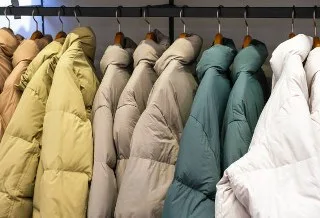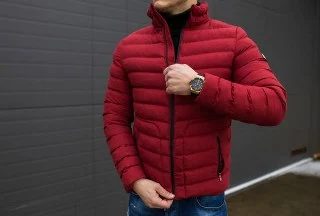Jacket Fabric
When it comes to picking out the perfect jacket fabric plays a major role. After all, it can determine how well you stay warm, how much the jacket will last, and even its breathability.
From natural fibers like wool and cotton to man-made synthetics such as nylon and polyester, there are many different types of fabrics available on the market today. And while they all have their own unique properties and advantages, they vary widely in terms of cost, durability, and appearance.
So if you’re looking to buy your next winter coat or summer jacket, it pays to do your research. In this article, we'll take you through a detailed guide to different types of fabrics used in jackets. By the end of this article, you'll have the knowledge you need to make an informed decision and find the best jacket fabric for your needs.
Properties of Natural Fibers: Cotton, Linen & Wool
When it comes to selecting the perfect jacket fabric, there are three natural fibers that stand out from the crowd: cotton, linen, and wool. Each of these fibers offers up a unique set of features to consider as you shop for your next jacket.
Let's start with cotton, which is both breathable and lightweight, making it a great option that is both comfortable and versatile. It's a great summer-weight choice, but can also be lined to make it suitable for cooler temperatures.
Linen is another popular choice in jacket fabrics. It's lightweight, breathable, and has a natural crease that helps create an "I woke up like this" look with minimal effort. Plus, it doesn't wrinkle or shrink as much as other materials—a major plus if you don't have time for daily ironing sessions!
Finally, wool jackets offer up a bit more structure than their cotton and linen counterparts since wool is heavier than the other two options. Wool jackets also offer up impressive insulation qualities due to their tight weaving and moisture-wicking ability—which makes them perfect for cold weather dressing!
All three materials may drape differently depending on the thickness of the fiber—so don't be afraid to go into a store to test them out before making your decision.
Synthetic Fabrics: Nylon, Polyester & Fleece
Synthetic fabrics are often used to make jackets and other winter outerwear. Some of the most popular synthetic fabrics are nylon, polyester, and fleece.
Nylon is a lightweight fabric that is water-resistant and breathable. It provides flexibility and is ideal for activewear like windbreakers or ski jackets.
Polyester is a strong, durable fabric that resists wrinkles and maintains its shape when stretched or pulled. It also has a natural shine, making it great for dressier jackets and coats.
Fleece is a cozy material that makes excellent cold-weather garments. It's lightweight, soft to the touch, and provides warmth without added bulk—perfect for sweaters and light winter coats on mildly chilly days.
Pros and Cons of Different Jacket Fabrics
When it comes to jackets, the fabric you choose matters, depending on how much warmth and protection you're looking for. Here are the pros and cons of some of the most popular jacket fabrics available.
Cotton
Cotton is a lightweight and breathable fabric that's great for warmer climates. It's also naturally water-resistant and durable, which means it can hold up to wear and tear over time. The downside is that it's not very insulating, so if you're looking for a jacket that can keep you warm, cotton is not your best option.
Wool
Wool is one of the most popular fabrics used for jackets, as it's extremely warm and durable. It's also water-resistant, so it can keep you dry in light rain or snow. The downside is that wool can be heavy and uncomfortable when wet, so if you plan on using your jacket in wet weather conditions, wool might not be your best choice.
Leather
Leather jackets are a stylish option that is known for their durability and comfort in cold weather. They're also waterproof and windproof, making them ideal for those who spend a lot of time outdoors. However, leather jackets are usually more expensive than other fabrics, so if you're looking for an affordable option, the leather may not be the best choice for you.
Weather Appropriate Jacket Fabrics
If you're looking for a jacket to keep you warm and cozy, wool is a great choice. Wool provides superior insulation and won't easily wear down over time, keeping you warm even when temperatures drop. Plus, it's incredibly breathable—it'll keep you cool during the hot summer months, too.
The great thing about wool is that it's incredibly versatile and comes in an array of colors, patterns, and textures. You can find everything from lightweight gabardine wool to heavy-duty melton wool—great for keeping out harsh winter gusts.
Even better, wool is relatively easy to maintain — just make sure to dry-clean it regularly to keep it looking sharp. It's also naturally fire-resistant and water-repellant, so rain won't be an issue either. So if you're looking for a fabric that can take on any weather condition with confidence, wool might just be the one for you.
Design Considerations for Jacket Fabrics
Now that you understand the different types of fabrics used for jackets, let's talk about the design considerations you should make when selecting one for your project.
How Will You Wear Your Jacket?
Think about how you'll use your jacket—will it be a casual weekend piece or a piece for more formal occasions? Cotton is often the go-to choice if you're searching for something casual, while wool is a better option if you're looking for something with a bit more polish.
Comfort Level
Another factor to consider is how comfortable you'd like the fabric to feel. Wool is known to be soft and luxurious, while cotton is lightweight and airy. Both are breathable materials, so they’re great options if you’re looking to layer up and keep warm in the winter months.
Durability
You should also take into account how often you're likely to wear your jacket. Wool tends to be much more durable than cotton, so it's better suited for everyday use. Cotton, on the other hand, is softer but less robust—great if your jacket won't be facing the elements on a regular basis.
Care and Maintenance Tips for Jacket Fabrics
Caring for and maintaining your jacket fabric is easy. Proper care will ensure that you get the most out of your jacket, so here are a few tips to keep in mind:
Cotton
Cotton jackets are usually machine-washable but always check the instructions on the tag. Air-dry cotton jackets and avoid tumble-drying them to prevent shrinkage. Iron cotton jackets on the lowest heat setting possible to keep them looking sharp.
Wool
Wool can be a bit more delicate than cotton, so hand-washing is ideal for wool jackets. Make sure to use cool water and a gentle detergent when hand-washing wool jackets, then air dry them flat or hang them up on a wide plastic hanger. Do not wring out wet wool as this can cause damage. If your wool jacket needs pressing, use a warm iron with a thick cloth between the iron and the garment.
It's always best to consult professional cleaners if you need help removing stains or treating specific types of fabrics, plus they often have the right tools and techniques available to clean your garment safely and effectively. With proper care, your jacket will last you years!
Conclusion
From cotton to wool, there are many types of fabrics to choose from when looking for a jacket. It’s important to know the characteristics of each fabric and how they will interact with your body, as well as the weather conditions, to ensure you find the jacket that is best suited to your lifestyle and wardrobe.
A great quality jacket not only looks good but lasts longer and is a great investment. With the right fabric, your jacket will take you through the changing seasons and many years to come. When you have the right knowledge and understanding of the fabric and the right care, your jacket is sure to stay stylish with you for many years.












0 Comments